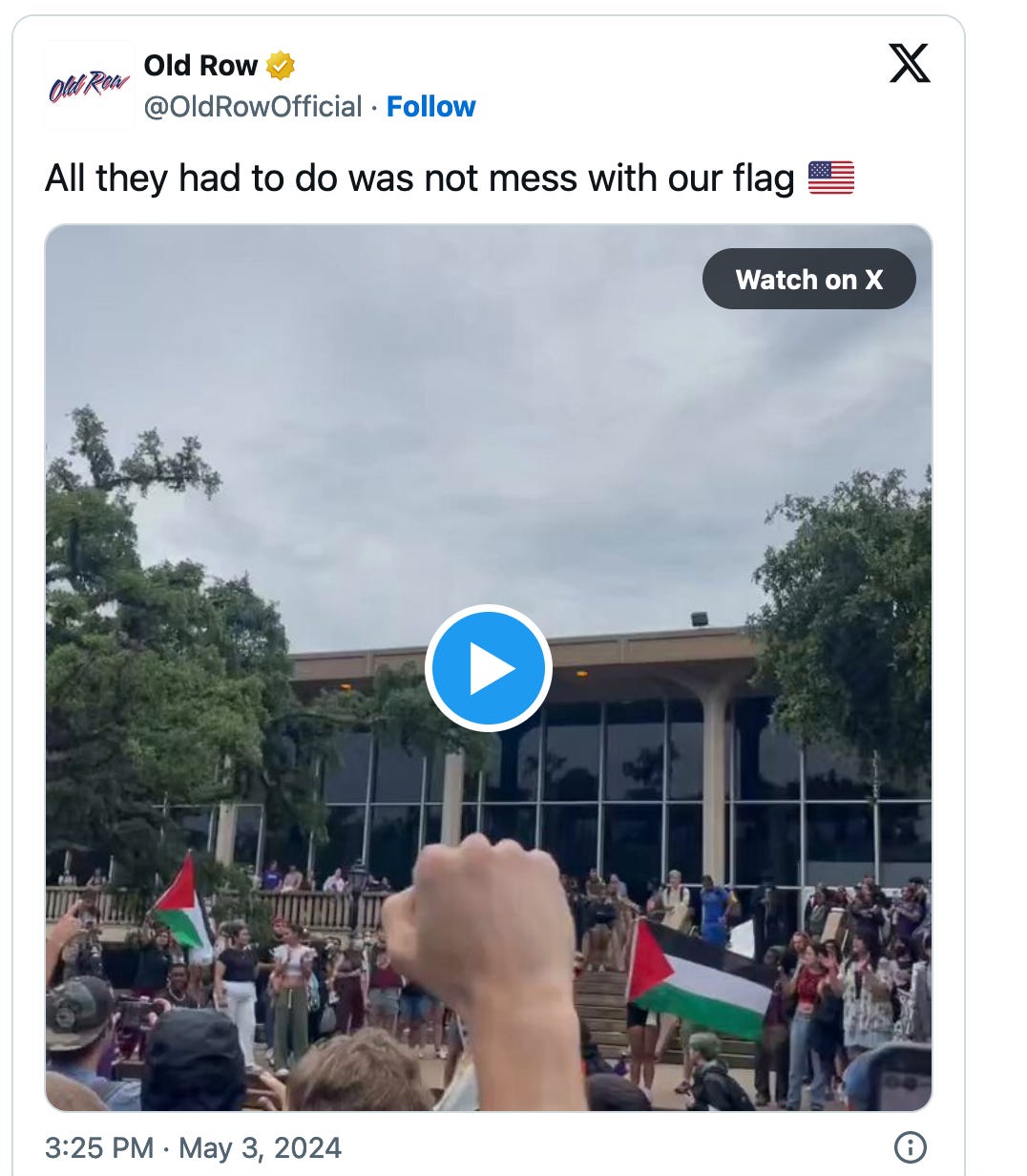Pushback Works
Campus political violence and the moral and practical aspects of resistance.
Pushback works.
That’s the lesson of the pro-Hamas protests on college campuses, and the reaction to them. It’s a lesson that many of us need to take to heart.
With support from lefty foundations and NGOs, and training from professional leftists activists, pro-Hamas encampments were established at campuses all across America. Libraries were the victim of rampages, Jewish students literally wound up hiding in attics, were assaulted, and were taunted and greeted with chants of “go back to Poland.” “Checkpoints” manned by Hamas sympathizers barred Jewish students, or anyone who wouldn’t renounce “Zionism,” from some parts of campus. American flags were torn down and replaced with Palestinian flags. It looked as if the protesters had the momentum, as university administrations responded supinely. And then, something happened.
People fought back. Mostly fraternity guys, who in this season have become the defenders of Western civilization.
For decades, of course, leftist mobs on campus have run wild without much pushback. Their threats and destruction have been excused as just a “passion for justice” or some such twaddle. While university administrators demand exquisite sensitivity to the feelings of favored groups, everyone else is told to just put up with lefty excesses.
But a funny thing happened: When people started pushing back, suddenly the administrators got some backbone.
To be fair, the pushback hasn’t just been from frat guys. There had been pressure from donors sufficient to get some university presidents fired, but when it came to getting the encampments moved off campus, it was the on-campus resistance that did it.
It wasn’t just frat guys. UCLA told its police not to do anything to the pro-Hamas encampment even after a pro-Israel Jewish girl was beaten unconscious. It was attacked by pro-Israel students and neighbors, and torn down, while the police didn’t arrive to the encampment – which reportedly was emblazoned with “All Cops Are Bastards” and the like – for two hours. But afterwards, UCLA removed the encampment.
Since then, Columbia, the University of Chicago, MIT, and Harvard have all done the same. [CORRRECTION: There were reports that Harvard was shutting its encampment down, but it’s still there.]
The fact is, if nobody resists, most people will go with the flow even if they don’t like it. And administrators won’t lift a finger to protect unpopular minorities from one-sided violence. But as soon as the violence becomes two-sided, they fear expanding disorder and act to bring things under control. When you’re being assaulted and terrorized, that’s your problem. When you fight back, you make it everybody’s problem, and the authorities are under pressure to act. In their magisterial article on self-defense and genocide, Don Kates and Dan Polsby observe that self-defense forces authorities to intervene: “First, armed self-defense brought police intervention which martyrdom would not have done. African-Americans, Catholics, Jews, immigrants, and radicals were neither popular nor powerful in the areas in which the KKK thrived. Public authorities and influential private citizens might well have been content to see unarmed victims brutalized or slain, if the violence could have been so confined. When victims arm themselves, however, authorities are compelled to act lest incidents lead to widespread bloodshed and disorder.”
In addition, they note the moral aspect of resistance: Resistance breeds resistance, courage promotes courage, and the aggressors tend to rethink things when it looks as if they might be the victims, not just the perpetrators, of violence: “Second, gun ownership gave victim groups both the courage and the means to sustain themselves in the face of the KKK threat and police indifference or hostility. In fact, victim perseverance was essential to eventually discrediting the KKK. By defeating its initial attacks, maintaining themselves, and asserting their rights, victims encouraged decent citizens in the majority community to come to their aid.”
Well, what’s happening on college campuses isn’t a replay of the Ku Klux Klan, or of Kristallnacht, though there are more similarities than one might wish. But it’s well known that the most effective response to bullying is to make the bully pay a price. That’s what’s happened here, and in response we saw university administrators, who had been happy to stand by, and to order police to do the same, suddenly decide that violence might be a bad thing.
UCLA’s Chancellor talked about his “pain” over the campus confrontations, leading outgoing UCLA lawprof Eugene Volokh – who is decamping to the more peaceful environs of the Hoover Institution – to quote Jesse Singal: “What if widespread disorder is. . . bad? And should be prevented?”
Yes. What if?





Very good piece, Glenn.
Former Nebraska senator Ben Sasse has been the President of the University of Florida for the past year. He would agree with you. Here’s part of what he wrote a few days ago (May 3, 2024) in the Wall Street Journal.
“Actions have consequences. At the University of Florida, we have repeatedly, patiently explained two things to protesters: We will always defend your rights to free speech and free assembly—but if you cross the line on clearly prohibited activities, you will be thrown off campus and suspended.
“In Gainesville, that means a three-year prohibition from campus. That’s serious. We said it. We meant it. We enforced it. We wish we didn’t have to, but the students weighed the costs, made their decisions, and will own the consequences as adults. We’re a university, not a daycare. We don’t coddle emotions, we wrestle with ideas.”
I rather suspect that campus bureaucrats started pushing back because the word came down from the DNC that the optics were bad for Joe and his puppet masters.